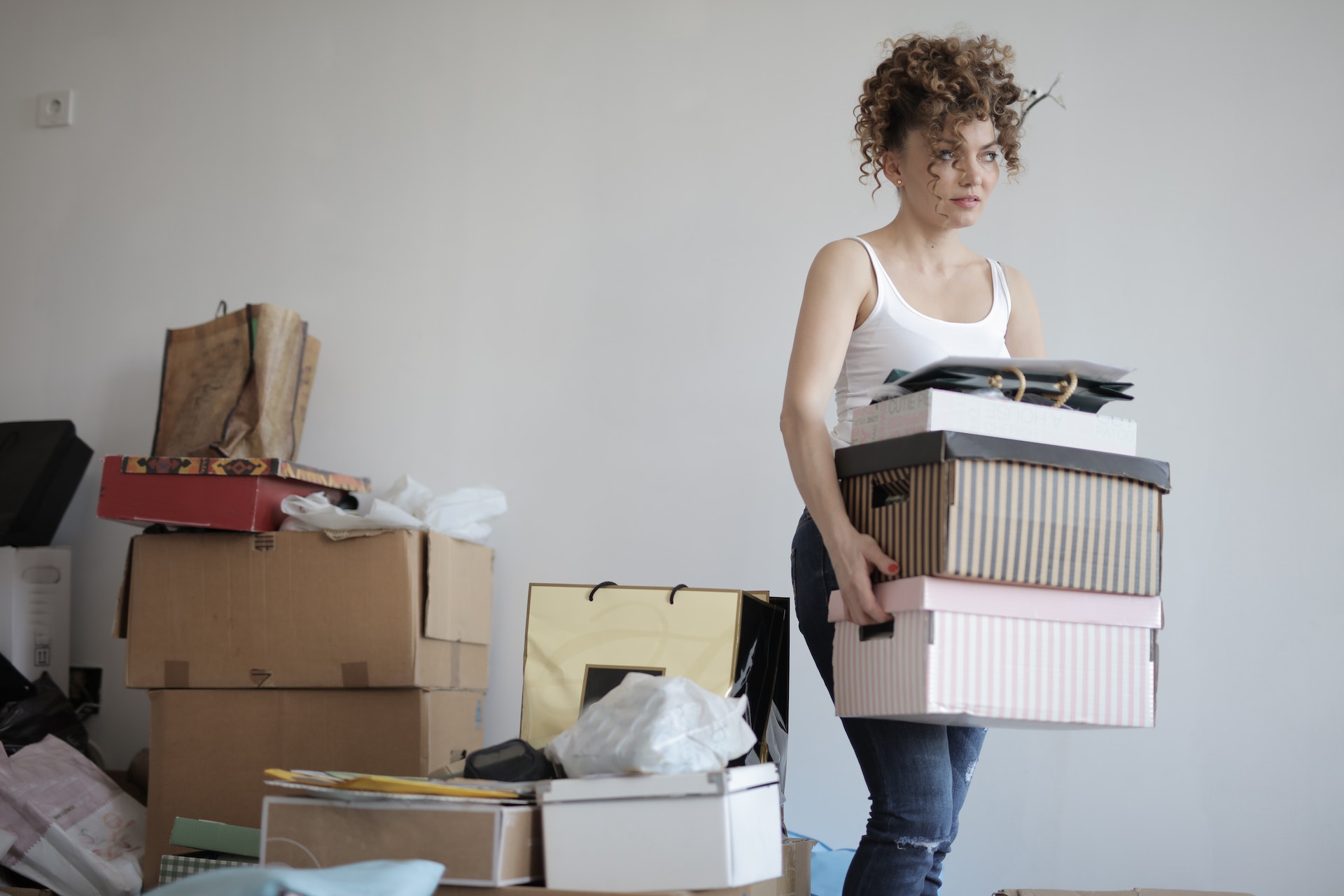

Did you know that February is Declutter for a Cause Month? With the New Year behind us and spring cleaning approaching our minds, February is the right time to declutter. The added benefit of donating is getting rid of stuff you don’t need while helping others.
How Does Declutter for a Cause Work?
People are encouraged to declutter their homes and workplaces during Declutter for a Cause month in February and donate their belongings to nonprofit organizations.
To promote the cause, people are encouraged to donate unused or unwanted items to charitable organizations. Why? Because there’s a shortage of funds and a high workload for many charities, and they need our help.
Don’t know where to donate your items? For more information on which charities to donate to, take a look at Dylan Matthews’ article at Vox.
You can also start your own cause to donate to this month if you prefer. For example, if your child attends school, you can set up a fundraising event or a charity event. You might also consider having a neighborhood yard or garage sale and donating the proceeds to a local charity.
Also, creating a Facebook fundraising event is easy and convenient to promote nonprofit awareness. And your business network can be a valuable asset in spreading the word about a nonprofit organization you support.
Why Participate in Declutter for a Cause?
Decluttering will improve your mood.
By making physical activity part of the organizing process, the mind can wander, enhancing creativity. In addition to keeping our bodies active, we can relax mentally by organizing our clutter.
In addition to feeling less stressed about what once was clutter, seeing the progress can boost our mood.
Relieves anxiety
Unorganized or dirty areas can often trigger anxiety. Clutter may constantly stress you out, make you feel worried, or make you afraid that more clutter will accumulate. As such, we can feel calmer and think clearer when we declutter our minds, allowing them to find peace.
You’ll sleep better
Stressed out by your messy closet or the laundry pile on the floor while lying in bed? People who sleep in clutter are more likely to develop sleeping problems and are at a higher risk of developing hoarding disorders, according to a study by the American Academy of Sleep Medicine.
In short, put away your clutter and create a peaceful environment for yourself so you can get quality sleep.
Asthma and allergy risks are reduced.
Sure. Your house may be a tad messy. But it’s not dirty, right?
The reality is that it’s difficult to clean around piles of stuff. However, getting rid of clutter will keep pests away and reduce dust, mold, and mildew, which will keep asthma and allergies at bay.
Having too much clutter in the office can cause burnout and make us less productive.
Getting rid of clutter around you has a lot of benefits because exposure to disorganized, cluttered environments can make you lose focus, attention, and concentration. It may even drain your cognitive resources, according to fMRI studies. Furthermore, living in a cluttered space is linked to reduced productivity and chronic procrastination, according to a study published in September 2017.
“Clutter reflects an overabundance of possessions that collectively create chaotic and disorderly living spaces,” explains Joseph Ferrari, Ph.D., a professor of community psychology at DePaul University in Chicago, whose research examines clutter’s effects on emotional health. “Clutter is often the result of an overattachment to our personal items, which makes it difficult to part with them. It isn’t abundance that’s the problem as much as an attachment to abundance.”
It’s important to note that clutter and procrastination go hand in hand. Researchers found that indecision and procrastination at work contribute to office clutter, according to an article in Environment and Behavior. In addition, according to a study published in January 2021 in the North American Journal of Psychology, indecision, and procrastination are also linked to clutter in the home office.
Work performance isn’t the only thing hampered by clutter. According to a study published in the International Journal of Psychological Research and Reviews in 2021, office clutter (paper, trash, and office supplies) negatively affects job satisfaction. In addition, it increases burnout risk, especially for managers and business owners.
You’ll have better concentration.
Is your desk piled high with papers? When you’re trying to complete a project, are you constantly distracted by papers or moving them out of the way? It can be distracting and affect your focus and productivity to have too much stuff around you.
People perform better in an organized environment versus a disorganized one, according to Princeton University researchers. Conversely, according to the study, physical clutter in your environment makes you less productive and stressed.
Giving to charities is good for your health and well-being.
A study published in 2016 in the journal Health Psychology found that giving to charity for three weeks lowered blood pressure. In addition, taking up a consistent exercise routine was also associated with blood pressure reductions caused by prosocial spending.
According to another study published in the American Journal of Lifestyle Medicine in January 2021, prosocial behaviors help reduce stress and inflammation. This leads to mental and physical health problems. The journal Psychoneuroendocrinology published a paper in 2017 showing that prosocial behaviors can affect our genes, improving overall health.
Decluttering for a Cause
Decluttering can be challenging when you don’t know where to start.
Put yourself in the right frame of mind. Have fun with it. Get your favorite tunes playing. And don’t forget to take before and after pictures. Document your progress.
I’d recommend going room by room too. Try narrowing it down if it’s too overwhelming. For example, you could start with your bedroom closet or office desk. Maybe you could also designate one room per week.
These are some other things you can do to declutter your space.
- Choose three trash bags, three boxes, three baskets, or three Rubbermaid tubs to get started.
- Trash and recyclables will go in one bag.
- The other bag is for stuff that doesn’t belong there.
- You’ll donate one bag of belongings to charity.
Similarly, you may want a bag for:
- Things that need mending or fixing.
- Bag for returning items to someone you borrowed them from.
- A bag for stuff that gets returned to its original place, such as library books to the Library.
- Make a bag for things you’ll sell on Craigslist, Facebook, or another site.
Whatever number of bags you want to try to keep up with is up to you. However, I recommend only trashing, putting away, and donating the three bags if you are just starting out.
You will need to sort your belongings into one of the three bags, regardless of the space you are decluttering. Consider leaving out anything you are unsure of or something you find questionable. It can be dealt with later.
As you get started, you’ll want to move swiftly through your stuff and not stop to analyze every single item. If you get stuck on something, set it aside, so you can keep moving forward.
The following tips will help you declutter your home.
- Get rid of anything you haven’t used for a couple of years.
- Throw away expired items. The food bank can decide whether pantry items that have expired and not gone bad are good or bad if you send a box to them.
- You should throw away anything you haven’t touched for ten years.
- If you do not like the item and do not use it, get rid of it.
- It is a good idea to weigh the pros and cons of keeping anything if you are unsure whether you will use it in the future.
- How long has it been since you could have used this item, and why haven’t you done so?
- Is it possible to replace the item easily?
- Should you sell it if you think it is valuable?
- Could it be better to donate it somewhere that needs it more than you?
- If the item were to be replaced, how much would it cost?
- Would it be challenging to store, clean, and maintain the item? Is keeping it a nuisance?
Give that last question some serious thought. Be sure you’re not holding on to anything that’s not necessary. Creating a minimalist space is about simplifying. In other words, keep only the items you use, need, and desire.
Consider storing unreplaceable items in a bin in your garage or attic if they are questionable. Then, you will have those items ready if you decide to use them in the future. Even if you don’t need your belongings, knowing you can access them provides some comfort. Don’t be too hard on yourself.
Decluttering By Room
Bedroom
You should first make your bed and tidy your room. There’s a fantastic book everyone should read called Make Your Bed, by William H. McRaven — based on a Navy SEAL’s inspiring graduation speech. Anyway — making your bed every day helps every area of your life.
After you’ve made your bed — pick up any clothes lying on the floor. Hang them up, put away, or throw them in the laundry. After that, go through the drawers of the dresser, the nightstand, and the closet. Finally, it is time to eliminate items that no longer fit you or that you never wear — or things you do not want to wear.
Also, make sure you don’t forget the bathroom. It is essential to check the medicine cabinet and beauty products. Is there anything that has expired? If so, throw them away. However, it is better to return unused medications to the pharmacy than to throw them away or flush them down the toilet. Make sure you wipe down shelves and surfaces that don’t get much attention.
Kitchen
Make an inventory of small appliances and gadgets for the kitchen. Is there anything you no longer use or need? It is the same with coffee mugs, utensils, cookware, and flatware as well. You should clean your pantry and refrigerator while you are in the kitchen. Is there anything that has expired? Throw it away.
Child’s room & pet supplies
During Declutter Month, children can learn about generosity by donating gently used toys and clothing to those in need. Include them in the sorting of pet supplies and toys as well.
Garage & basement
Organize shelves, drawers, and cabinets by sorting through them. Can anything be thrown away? Donate and recycle what you can.
Consult your accountant about the length of time you should keep certain financial records (hard copy & digital). Ensure that chemicals, solvents, paints, etc., are correctly disposed of. Be aware of local regulations and read them carefully.
Workplace
As with your home, start by only keeping the things you need. In addition, you can sort by “keep,” “recycle/trash,” or “belongs elsewhere.”
The majority of your clutter, however, is probably paper-based: documents, business cards, sticky notes, meeting notes, and so on. Not only do these take up space, but most of them aren’t something you’d look at regularly. Make electronic copies of your documents by scanning or typing them instead of keeping them around for the off-chance that you might need them one day.
You can easily and quickly store documents and details on your smartphone with a number of apps available on your device. Documents you cannot lose should be photographed, and paper copies should be discarded or recycled. There are also note-taking apps like Evernote, Google Docs, and Google Keep (a note), as well as the Notes app for iOS and Android. You can synchronize notes across multiple devices and digitize them through the cloud.
Donating Your Belongings
If you are interested in learning more about Declutter for a Cause, you are welcome to visit their Facebook page. There is a lot of helpful information on their page about different causes you can participate in, what you need to know before donating, and items you can contribute.
You can donate pet blankets to the Snuggles Project if you live near an animal shelter that participates. In addition, any blanket or throw you have around the house can be donated to this very worthy cause.
If you are able, donate to your local shelters and food banks. Most major cities have hospitals in need, local charities, shelters for the homeless, and shelters for abuse victims. Using your skills and donations, you can make a difference to others.
Image Credit: Photo by Andrea Piacquadio; Pexels; Thank you!











Deanna Ritchie
Editor-in-Chief at Calendar. Former Editor-in-Chief and writer at Startup Grind. Freelance editor at Entrepreneur.com. Deanna loves to help build startups, and guide them to discover the business value of their online content and social media marketing.